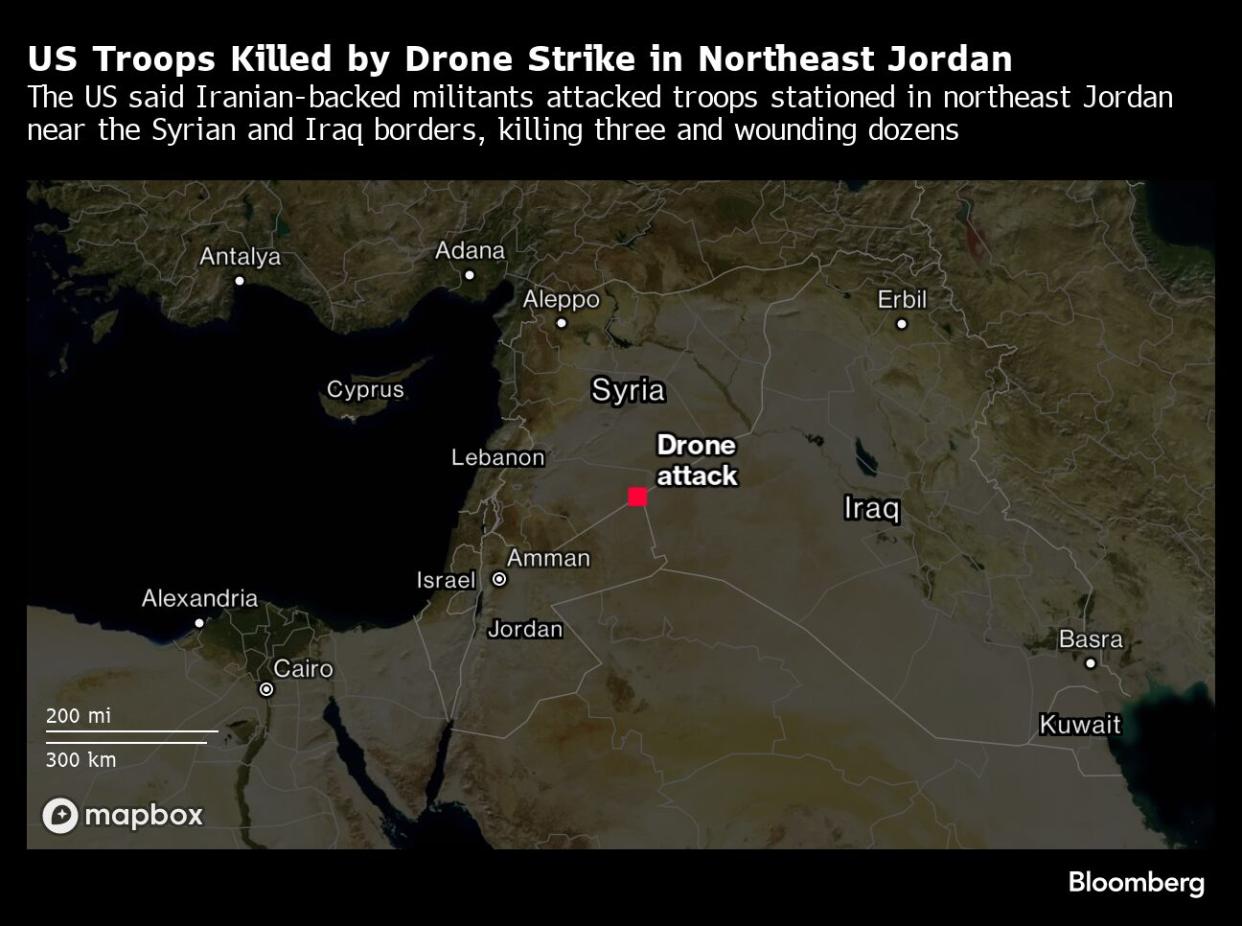US Seeks Just-Tough-Enough Response to Deadly Mideast Attack

(Bloomberg) -- President Joe Biden’s administration is seeking a response to the deadly attack on US forces in Jordan that’s tough enough to deter Iran and its proxies without sparking direct warfare with the Islamic Republic, according to officials and experts.
Most Read from Bloomberg
Musk Pay Package Voided, Threatening World’s Biggest Fortune
Tech Giants Slide in Late Trading After Earnings: Markets Wrap
UPS CEO Kicks Off Productivity Drive by Cutting 12,000 Managers
Microsoft Sales Top Estimates; Cloud Growth Disappoints Some
“We will do whatever we need to do to protect our forces going forward, but certainly at the end of the day we are not looking to engage in a wider conflict but merely to ensure regional security and stability,” Major General Pat Ryder, a Pentagon spokesperson, said Monday in an interview on Bloomberg Television.
US Weighs Response to Deadly Drone Attack as Iran Denies Role
Biden is facing mounting political pressure at home to respond forcefully to the drone assault, which killed three US soldiers and wounded dozens of others. They were the first Americans to die from such an attack since regional tensions were inflamed by the start of the Israel-Hamas war in Gaza in October.
“Hit Iran now,” said hawkish Republican Senator Lindsey Graham. “Hit them hard.”
The most likely scenario is that the US will target Iranian-aligned assets outside Iran, according to Suzanne DiMaggio, a senior fellow at the Carnegie Endowment for International Peace. “A direct attack on Iranian territory runs the high risk of igniting an expanded war by design or by accident” and jeopardizing ongoing hostage and cease-fire negotiations in Israel’s war with Hamas in Gaza, she said. Hamas is designated a terrorist organization by the US and EU.
The US could hit forces of Iran’s Islamic Revolutionary Guards Corps deployed in locations such as Syria, Iraq or Yemen. Thomas Spoehr, a retired Army lieutenant general and national security consultant, said “they have to hit uniformed Iran service members.” He said, “I don’t think these people are probably hard to find,” he said.
John Kirby, spokesman for the US National Security Council, told reporters at the White House that Biden met with his national security team both Sunday and Monday and is “weighing the options before him.” Kirby said, “we will respond. We’ll do that on our schedule, and our time, and we’ll do it in the manner of the president’s choosing as commander-in-chief.”
Maintaining Ambiguity
At least so far, it’s been of value for both the US and Iran to maintain ambiguity about whether the groups armed and aided by Iran are acting with a measure of independence. On Sunday, Biden didn’t directly blame Tehran, saying the attack “was carried out by radical Iran-backed militant groups operating in Syria and Iraq.”
Iran said any suggestion it was responsible was “baseless” and insisted the groups that it’s allied with act independently.
“Resistance groups in the region do not take orders from the Islamic Republic,” Foreign Ministry spokesman Nasser Kanaani said. He was referring to what’s often called the “axis of resistance” — a network of militias in territories from Yemen to Iraq and Gaza that are supported by Tehran and share its opposition to the US and Israel.
Washington’s response will be stronger than its most recent retaliations against Iranian proxies, according to a person familiar with the US position, underlining the risks of further escalation in a conflict that’s already spread from Gaza across the Middle East.
“The US faces bad options only,” said Firas Modad, head of Modad Geopolitics, a risk-advisory firm. Biden is under “immense pressure” to respond to the deaths in Jordan, but a direct conflict with Iran would likely result in higher energy prices and significant casualties, he said.
Oil initially rose 1.5% on Monday, with Brent climbing above $84 a barrel. But it later reversed those gains to close 1.4% lower. It was steady in early trading on Tuesday.
Iran’s currency, the rial, fell to its weakest level on the black market since the start of the Israel-Hamas war, according to Bonbast.com, a website that tracks the exchange rate.
How Iran-Backed Groups Are Widening Mideast Conflict: QuickTake
Politically, the challenge for Biden is to project toughness toward Iran without embroiling the US in active warfare — and without raising oil prices in an election year. That could sting American consumers by pushing up the cost of gasoline.
The US has become increasingly embroiled in the Middle East since Oct. 7, when Hamas attacked Israel. The Pentagon sent more naval and air forces to the region to support the Israelis and deter attacks on them from the likes of Hezbollah, which is based in Lebanon. This month, it’s launched missiles at Yemen to try to stop assaults on commercial and military ships in the Red Sea by the Houthis. Hamas, Hezbollah and the Houthis are all armed and supported by Iran.
General Killed
In 2020, under then-President Donald Trump, the US assassinated Iranian general Qassem Soleimani in Iraq, saying he was responsible for planning attacks on Americans through Tehran’s proxies. Iran responded by striking US bases in Iraq, injuring many troops but not killing any. Tensions between Washington and Tehran eased after that.
“The US will retaliate — that much is clear,” said Ziad Daoud, chief emerging markets economist for Bloomberg Economics. “The question is whether Iran will absorb the hit, or react to the retaliation. At stake is higher oil prices and a potential global recession.”
--With assistance from Peter Martin and Justin Sink.
(Updates with oil prices.)
Most Read from Bloomberg Businessweek
There’s So Much Data Even Spies Are Struggling to Find Secrets
Basketball, Basketball, Basketball: Inside Steve Ballmer’s New $2 Billion Arena
Chinese Students Abroad Struggle With Tuition as Economy Falters
©2024 Bloomberg L.P.

 Yahoo News
Yahoo News 

